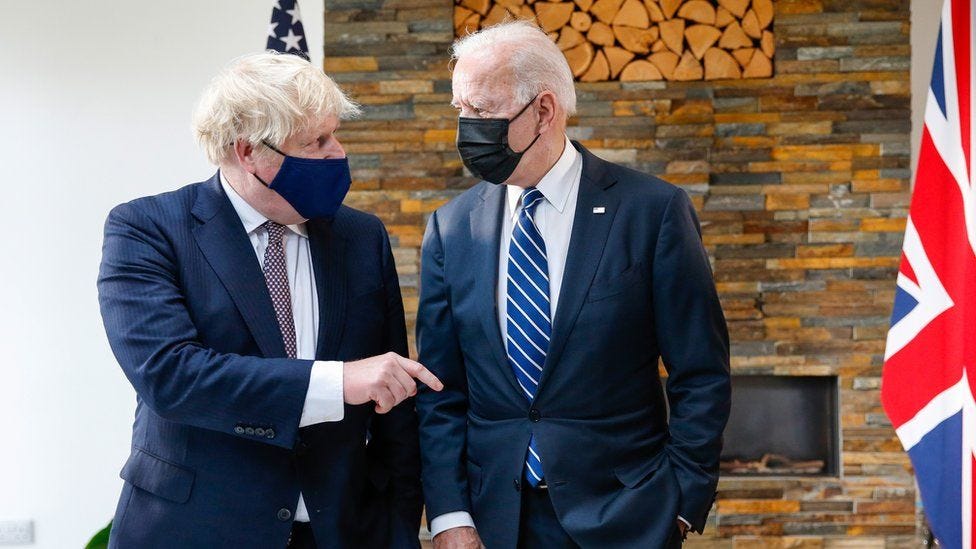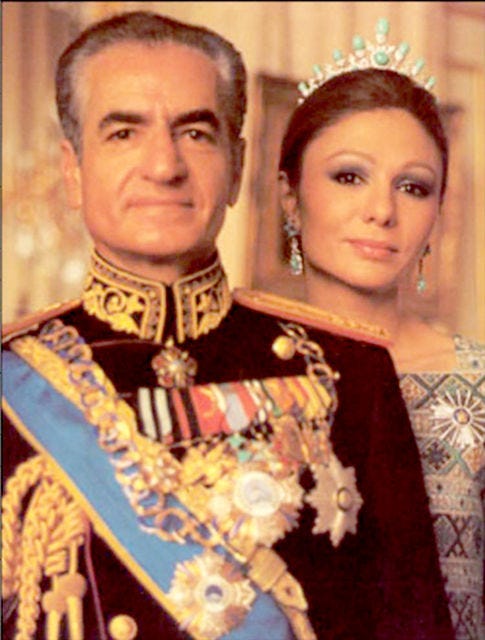Joe Biden previously called Saudi Arabia a “pariah state,” but went there hat in hand last week to beg for more oil, failing at the task. However, the imperium of woke values that led Joe Biden to elevate high-minded human rights assertions above our national interests in the first place remains the bedrock of U.S. foreign policy. It is kept in place by both parties in Washington, and it is wrecking our power in the world while allowing the rising East to leave us behind.
Joe Biden’s trip was botched, incurring all of the downside of a visit and none of the desired upside. Upon arrival, Joe Biden fist-bumped Saudi Crown Prince Mohammed bin Salman, earning the ire of human rights activists and the Washington Post. The latter is a leftwing political tabloid that employed an Islamist activist, Jamal Khashoggi, whom the Saudis murdered in their consulate in Istanbul in 2018. The Washington Post had given him its only Arabic-language column in an effort to weaken the Saudi monarchy to the primary benefit of the Muslim Brotherhood.
Killing this activist was not Saudi Arabia’s only sin in the eyes of Joe Biden and his fellow progressives. Riyadh also cooperated with Donald Trump, and, along with other Arab states and Israel, has opposed Joe Biden’s attempt to achieve friendly relations with Iran’s terrorism-exporting, nuclear-crazy regime.
While Saudi did not join Trump’s historic breakthrough of peace and economic cooperation between Israel and Arab states, which was led by the United Arab Emirates, it also declined to throw its weight to stop the agreement. This was apostasy to Joe Biden and the rest of the Washington foreign policy establishment, which long held that achieving peace required forcing Israel to cut a deal with the groups that advocate its destruction. It was also inimical to them that a crass businessman from New York could succeed where generations of fancy boys from the foreign policy elite had failed.
Therefore Joe Biden intentionally downgraded relations with the second-largest producer of oil in the world (after the USA). He instead prioritized diplomacy with pointless Europe, which his officials called “our traditional allies.” That’s a great move if you want to make the world safe for cocktail parties. It’s not so good if you need occasionally to call on governments that can do real things in the world, like producing more oil to cut the cost of gasoline or stand up to Iran.
Who knows if Joe Biden’s climb-down marks a turning point or not. What began with President George W. Bush’s “freedom agenda” after the 9/11 attacks on the USA has evolved into a full-blown human rights-industrial complex in Washington. Bush and most of his aides never got their minds around Islamism, which is the political force that in the 2000s animated enemies as diverse as al Qaeda, the Taliban, the Muslim Brotherhood, and the Iranian regime.
Bush’s freedom agenda was directed instead at illiberalism and corruption in the Middle East (and overlooked the lack of freedom in China). The agenda began to falter with the failure to install democracy in Iraq, but its final death occurred in the Obama-era Arab Spring, during which it became clear to everyone except the human rights glee club that classical liberal political forces would always and everywhere lose to better-organized Islamists in the Middle East if given the chance. For example, the Muslim Brotherhood won power in Egypt until it was thankfully deposed by the Egyptian military. Last summer’s triumph by the Taliban in Afghanistan was the coda of this sad era.
However, failure is seldom an impediment to policy in today’s Washington, and Joe Biden and both parties in Congress continue to base policy emotionally and self-indulgently on this principle. Last December, the administration held a self-congratulating “Summit for Democracy” in Washington, and proclaimed a “year of action.” The gathering’s summary of proceedings boasted:
These included commitments to counter [sic] efforts to combat disinformation; strengthen electoral integrity; better promote the human rights of activists, women and girls, youth, LGBTQI+ persons, persons with disabilities, and marginalized populations; address drivers of inequality and inequity…
Two democracies weren’t invited—Singapore and Hungary—because they weren’t woke enough. Lucky them: the event amounted to a woke junior varsity version of the ComIntern that was completely divorced from U.S. economic, military, and political interests that actually matter in the world.
High-minded human rights posturing also drives Washington’s decision to wage an undeclared, unauthorized proxy war with Russia in Ukraine. Most Americans understand that China, not Russia, is the key threat we face. Increasingly, they also see Ukraine as no less corrupt or repressive that Russia, and a problem that should be left to Europeans, who after all are closer to the problem and have an economy just as large as ours. (A poll this week shows only 42% of voters approve of Joe Biden’s performance on Russia-Ukraine.)
Instead, Washington has our citizens paying more than four bucks a gallon for gas, while giving China, India, and almost everyone else but Europe a huge discount on Russian oil shunned by the West, all the while losing yet another war despite sending Ukraine $53 billion and counting. However, woke U.S. diplomats can take a short break from hanging Black Lives Matter banners and rainbow flags on our embassies abroad to talk up our great solidarity with the postmodern liberal moochers of Europe. In a rare moment of candor, an aide to Joe Biden even said that Americans have to pay higher gas prices indefinitely because, “This is about the future of the liberal world order and we have to stand firm.”
This policy is clearly ineffective if our record of foreign milestones since 1991 are considered: lost wars, failed nation-building, a military unprepared to deter China. It is also contrary to our traditional foreign policy and the instincts of normal Americans. President John Quincy Adams said of the USA, “She is the well-wisher to the freedom and independence of all,” but he preceded that line with, “But she goes not abroad in search of monsters to destroy.” Contrary to this advice, we seem to be on a global crusade against those who, for example, question whether men can give birth.
We are also ignoring the advice of President Theodore Roosevelt, who adapted an African adage to urge America to “Speak softly and carry a big stick.” Instead, we have run down our Navy and Air Force, and have an Army that is expert at losing counterinsurgencies in backwaters of little relevance. The stick we need to deter China is broken, but we shoot off our mouths preaching the arrogant woke ideology that is dividing our own country, as if it is something others should desire.
Another former president provides an alternative that has a prominent place for human rights, but keeps the matter in perspective next to pressing national interests that may require doing business with someone other than the boy scouts: Ronald Reagan. The Gipper inherited a lamentable national security situation not unlike the one Joe Biden and his Beltway friends in both parties have delivered us today: American credibility smashed by defeat (Vietnam, Iran hostage rescue failure) and “human rights” being used to weaken crucial Cold War allies like the Shah of Iran even though the alternatives were far more brutal and repressive.
Reagan spoke plainly about the nature of our opponents, including calling the Soviet Union an “evil empire.” However, he still negotiated nuclear arms control deals with Moscow because that was in our vital national interest.
Reagan mostly reserved criticism for authoritarian U.S. allies for meetings behind closed doors. He was able to work pragmatically with military or authoritarian governments like those in the Philippines, South Korea, and Taiwan, while also gesturing them down the path of liberalization, which most took.
Reagan also took great care in choosing dissidents whose mistreatment personified the evil nature of our enemies in the world. One such example was Natan Sharansky, a Soviet “refusenik” Jew who wished to emigrate to Israel. He eventually did thanks to pressure from Reagan, neatly illustrating the repressive nature of the Soviet regime but also giving it a path to modest acclaim for showing some humanity and reform on occasion.
It is unlikely that Reagan would have chosen to elevate a victim like Khashoggi, no matter how unjustified his murder, given that such an act weakens a U.S. ally and elevates a cause—political Islam—that threatens America. Instead, he might look toward our primary adversary, China, and choose to elevate dissidents like Jimmy Lai, the deposed publisher and famous Catholic layman the Chinese have locked up in Hong Kong, or Joseph Zen, the 90-year-old cardinal who may soon join Lai in prison for daring to stand up for the freedom once enjoyed in that former British colony. Reagan would try to get them out of prison and out of China. If he succeeded, he wouldn’t hesitate to give Beijing a little credit.
Returning to a foreign policy based not on woke self-indulgence but on national interests, carefully selected priorities, and a realization that military budgets will have to decline in the coming recession and government financial crunch, will not originate from Washington. As we have seen with the Ukraine war, it is often hard to tell the difference between Democrats and Republicans in Washington when it comes to foreign policy (with some notable exceptions). Instead, we will need a new president who puts America first.
It’s Like, Um, Slavery or Something
Cackling Kama-lama-ding-dong addressed the NAACP and said that the recent Supreme Court ruling overturning Roe vs. Wade was like—you guessed it—slavery. She complained that “our country has a history of claiming ownership over human bodies.” The “so-called leaders” of the anti-abortion movement are apparently “the same ones who are passing laws to restrict the ability to vote,” said the so-called vice president.
The woman who learned California politics at the knee of Willie Brown couldn’t be more wrong. It was Roe that was the closest cousin in legal history to the 1857 Dred Scott decision, in which the Court declared blacks to be outside of the Constitution—essentially unpeople—and affirmed slavery. It was the law of the land until the Civil War, when a Republican president and Congress freed the Democrats’ slaves.
Roe also cast aside the laws of the states to declare a class of unpersons whom, the Court effectively asserted, had no rights. Overturning Roe returns the issue of regulating abortion to the states, where it belongs, and ends the most egregious judicial diminishment of human life since Dred Scott.
It’s odd that Kama-lama doesn’t grasp this reality since she was, according to herself, so badly oppressed by apparent segregationists like Joe Biden. Also odd is that Republicans who profess to be pro-life seem unable to make simple arguments in support of the Court’s decision and states that are moving to regulate abortion. If they tried fighting once in a while they might find they wouldn’t be so scared.
The Sound of One Hand Clapping
Some Trump cabinet members, like Secretary of State Mike Pompeo and Trade Representative Bob Lighthizer, were excellent. But many were were duds. Among those, some were in over their heads, like Attorney General Jeff Sessions. Some worked against Trump in the interest of the national security elite, like Secretary of Defense Jim “Moderate Dog” Mattis. Some were seen as lightweights, ruled by the bureaucrats they were sent to manage, like Homeland Security Secretary Kirstjen Nielsen. But only Secretary of Defense Mark Esper was all three.
This week, Esper and two colleagues from the Atlantic Council, a Europe-first, globalist think tank, turned up in Taiwan presumably in search of money. There could hardly be a better organization for Taiwanese not to support. Some say the Ukraine war will cause Washington to get serious about the security of Taiwan and the Western Pacific on the other side of the world from Ukraine. In reality, it is a distraction whose slow-motion failure will turn off more Americans from any intervention abroad. As for Esper, to the extent anyone thinks of him at all, he is held in contempt by both sides in Washington. There are many reasons to read General Keith Kellogg’s book about the Trump administration, “War by Other Means: A General in the Trump White House.” One of those reasons is the enjoyable schooling that Kellogg gave to Esper when the defense chief wanted to surrender to cultural Marxists attempting to rewrite America’s history.
And speaking of phonies, our network of spies reports that some consulting firms are misrepresenting their access to prospective Republican candidates. A particularly egregious offender is pitching clients on supposed access to both Trump and Florida Governor Ron DeSantis. However, one of DeSantis’s more endearing traits is that he doesn’t have an apparent Washington operation beyond the members of Congress with whom he served before becoming governor. It will be interesting to see whom he hires as policy types if he proceeds with a campaign. Will they be swamp critters like the ones who voted against Trump and then eagerly took jobs in his administration, only to undermine it from within? Or will they be good? Whoever they are, they would give a hint as to who would work in a DeSantis administration. In the meantime, ask for proof from anyone claims to be in or have access to this inner circle, since it doesn’t seem to exist yet.
“You most likely know it as Myanmar, but it'll always be Burma to me.” – J. Peterman
In a recent episode of Simon & Whiton, Mark and I discussed Asian business. Topics included Taiwan’s economy, semiconductors becoming boring again, and Southeast Asia overall. But we focused partly on Myanmar, which might be of interest to those examining emerging markets. Some edited excerpts:
[00:22:16] Christian Whiton: You mentioned Myanmar previously; I think you've actually been there many times. This country's also called Burma by some. They hosted a big confab recently: foreign ministers from China and five Mekong Delta countries and discussed economic cooperation…
[00:22:40] Mark Simon: It's a beautiful place.
[00:22:42] Christian Whiton: I wanna go, but I think there's sort of the remnants of a war going on or something. Anyway, this was the first multi-lateral ministerial meeting held in the country since last year's military takeover. And this is news because Myanmar has been shunned by the West for human rights violations in the military takeover. Is it possible that Myanmar is back to being an emerging market that just has some political risk or is this still really a no-go zone?
[00:23:17] Mark Simon: It’s not a market for the West because of all the human rights violations and all the problems, but the Chinese are throwing lots of money in there. The Thais are all over the place. The Hong Kong Chinese are building factories. The Taiwanese are down there.
Everybody's there. Myanmar has cheap labor and a growing consumer market. There's enough action out there for them to supply a lot of different places. One of the things that shocked me when I was there was how much stuff they were shipping to Africa, cheap clothing. They were shipping to the Eastern European countries with brands you've never heard of.
It’s a country that it's hard to get a fathom of how it's growing, but the fact of the matter is, is that people are employed. They haven't done anything stupid, like Sri Lanka. Um, but it's still a brutal regime. They lock you up if they don't like you, no matter who you are.
Check out video or audio of the full podcast episode:
“It’s easy when you’re big in Japan” – Alphaville
I moderated a panel at the Center for the National Interest that featured Nabe Wantanabe and Steve Yates. We discussed a “Changed and Changing Japan” in the wake of the assassination of Shinzo Abe and the global impact on energy of the Russia-Ukraine War. Have a look if you’re interested.
Parting Shot
On Fox Business “Mornings with Maria,” I asked a Ukrainian member of parliament a pointed question about why the USA needs to be involved given all of the downside to us. My question begins at the 3:00 mark. Judge for yourself whether her answer of expropriating foreign assets like we were a banana republic and giving them to Ukraine was candid or whether these officials have an enormous sense of entitlement and a sense from our government that they have a blank check.










Disgusting that both parties are involved in this.
Secretary of State Mike Pompeo was NOT excellent: Trump’s various peace plans had been “subdued, slow-rolled, and detoured by military leaders” throughout his presidency.
Former White House chief strategist Stephen Bannon, an opponent of forever wars in the Middle East, describes the institutional barriers he encountered preventing the troops from coming home.
“They literally would not give you any information. And the information they gave you was bullsh*t,” Bannon said. “In every presentation, they say you’re 18 months away from turning the war around. Always. You’re always 18 months away.”
Jim Jeffrey, Trump’s special envoy to Syria and the anti-ISIS coalition, proudly boasted about he and other colleagues committed treason throughout Trump’s presidency so troops could keep dying for the profits of defense contractors.
“We were always playing shell games to not make clear to our leadership how many troops we had there,” Jeffrey told DefenseOne after the Biden coup, adding that the troop number in Syria is “a lot more than” the approximately 200 that Trump authorized to stay there in 2019.
Additionally, hawks like Secretary of Defense Mike Pompeo aided in the plot – either wittingly or as a hapless dupe of deep state saboteurs. Pompeo boxed out foreign policy expert Will Ruger from the administration in early 2020. Ruger was a McEntee favorite who wanted troops removed from Afghanistan. Pompeo, a war hawk who rolled out the red carpet for neocon Never Trumpers to enter Trump’s White House, kept Ruger out at a time when Trump desperately needed an ally. https://bigleaguepolitics.com/revealed-how-pentagon-agents-subverted-trump-and-committed-treason-to-keep-troops-dying-overseas/